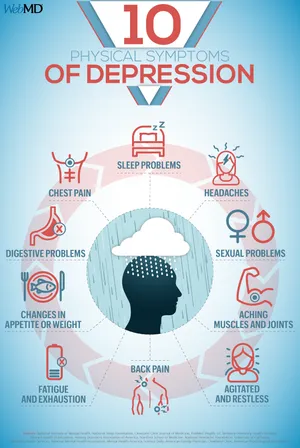Depression can have many underlying causes (Biological or Situational). In my opinion, Depression can be one of the most dangerous illnesses that I have seen in my 30+ years of Practice. Once again, as with most disorders, there needs to be an Individual Treatment Assessment & Plan. There is Not one Treatment that fits everyone.
When a person is suffering from Depression they can become more Isolated, Hopeless, Lethargic, Lonely, Suicidal, Violent, Feeling of Sadness, Tearfulness, Emptiness, Angry Outbursts, Irritability or Frustration, Loss of Interest & Pleasure in most activities, Sleep Disturbances, including Insomnia or Sleeping too much. For these reasons its hard to develop a support team because you might feel ashamed or just don't have the energy or motivation to help yourself.
Call Dr. Mitch so we can work together (quickly) in order to develop the cause and treatment to help you through this nightmare. Its awful that you have to experience this SUFFERING and NOT KNOW what is happening and why this is happening to you.
What Are the Causes and Symptoms of Depression?

Medically Reviewed by Smitha Bhandari, MD on August 26, 2022
3 min read
Everybody feels blue now and then, but most of the time it lasts just a few days and goes away on its own. Depression is different. It gets in the way of your daily life and makes it harder to do the things you love. You'll need treatment to get better.
Symptoms
There are a lot of signs of depression, but you may not have them all. How intense they are, and how long they last, are different from person to person.

Signs of depression can be physical.
Some of the ways you might feel are:
Sad, empty, or anxious. It will continue over time without getting better or going away.
Helpless, worthless, or guilty. You may feel bad about yourself or your life, or think a lot about losses or failures.
Hopeless. You may be pessimistic or believe that nothing good will ever happen. You may even think about suicide.
Irritable. You may get restless or more cranky than usual.
Less interest in activities. Hobbies or games you usually enjoy may not appeal to you. You may have little or no desire to eat or have sex.
Less energetic. You may feel extremely tired or think more slowly. Daily routines and tasks may seem too hard to manage.
Trouble concentrating. It could be tough to focus. Simple things like reading a newspaper or watching TV may be hard. You may have trouble remembering details. It might seem overwhelming to make a decision, whether it's big or small.
Changes in the way you sleep. You may wake up too early or have trouble falling asleep. The opposite can also happen. You may sleep much longer than usual.
Changes in appetite. You may overeat or not feel hungry. Depression often leads to weight gain or weight loss.
Aches and pains. You may have headaches, cramps, an upset stomach, or digestive problems.
Causes
Experts believe depression is due to a combination of things:
Brain structure. The way certain nerve pathways or circuits in your brain send information may not work properly. Scans show that the parts of your brain involved in mood, thinking, sleep, appetite, and behavior look different when you're depressed, but scientists aren't sure why.
Genes. Scientists are studying certain genes that may make you more likely to get it. But even if you have them, you may not get depressed. And depression can happen in some people even when they don't have that genetic makeup.
Depression can run in families, but that doesn't mean you'll develop depression just because someone you're related to has it. And you may have the condition even if no one else in your family has it.
Life events. Something disturbing or traumatic that happens to you may trigger depression. It may be the loss of someone close to you, a difficult relationship, or a stressful situation. Other things, like your finances, where you live, and whether or not you're married may also have an impact. But remember, there doesn't have to be a "reason" for your depression. Sometimes it happens without an obvious cause.
Childhood problems. People who have disturbing experiences in childhood are more likely to have depression. It may be from brain changes caused by trauma at a young age.
Other conditions. Drug or alcohol abuse, illness, long-term pain, anxiety, sleep problems, and attention deficit hyperactivity disorder may also be linked to depression.
If you think you're getting depressed, don’t try to tough it out. See your doctor. Lots of treatments can help, including antidepressants and talk therapy. And make sure you get the backing you need from family, friends, and support groups.
Codependency Checklist: BEST BOOKS FOR CODEPENDENCY:
Some Characteristics of Codependency:
Caretaking Codependents may: Codependency No More
● Think and feel responsible for other The New Codependency
people for other people's feelings, by Melody Beatty
thoughts, actions, choices, wants,
needs, wellbeing, lack of
well-being, and ultimate destiny. Your Erroneous Zones
● Feel anxiety, pity, and guilt when by Dr. Wayne Dryer
other people have a problem.
● Feel compelled almost forced to
help that person solve the problem,
such as offering unwanted advice,
giving a rapid-fire series of
suggestions, or fixing feelings.
● Feel angry when their help is not
effective.
● Anticipate other people's needs.
● Wonder why others do not do the
same for them.
● Find themselves saying yes when
they mean no, doing things they do
not really want to be doing, doing
more than their fair share of the
work, and doing things other
people can do for themselves.
● Not know what they want and need
or if they do, tell themselves what
they want, and need is not
important.
● Try to please others instead of
themselves.
● Find it easier to feel and express
anger about injustices done to
others, rather than injustices done
to themselves.
● Feel safest when giving.
● Feel insecure and guilty when
somebody gives to them.
● Feel sad because they spend their
whole lives giving to other people
and nobody gives to them.
● Find themselves attracted to needy
people.
● Find needy people attracted to
them.
● Feel bored, empty, and worthless if
they do not have a crisis in their
lives, a problem to solve, or
someone to help.
● Abandon their routine to respond to
or do something for somebody
else.
● Overcommit themselves.
● Feel harried and pressured.
● Believe deep inside other people
are somehow responsible for them.
● Blame others for the spot the
codependents are in.
● Say other people make the
codependents feel the way they do.
● Believe other people are making
them crazy.
● Feel angry, victimized,
unappreciated, and used.
● Find other people become
impatient or angry with them for all
the preceding characteristics.
Low Self-Worth Codependents might:
● Come from troubled, repressed,
or dysfunctional families.
● Deny their family was troubled,
repressed, or dysfunctional.
● Blame themselves for everything.
● Pick on themselves for
everything, including the way
they think, feel, look, act, and
behave.
● Get angry, defensive,
self-righteous, and indignant
when others blame and criticize
the codependents something
codependents regularly do to
themselves.
● Reject compliments or praise.
● Get depressed from a lack of
compliments and praise (stroke
deprivation).
● Feel different from the rest of the
world.
● Think they are not quite good
enough.
● Feel guilty about spending money
on themselves or doing
unnecessary or fun things for
themselves.
● Fear rejection.
● Take things personally.
● Have been victims of sexual,
physical, or emotional abuse,
neglect, abandonment, or
alcoholism.
● Feel like victims.
● Tell themselves they can't do
anything right.
● Be afraid of making mistakes.
● Wonder why they have a tough
time making decisions.
● Expect themselves to do
everything perfectly.
● Wonder why they can't get
anything done to their
satisfaction.
● Have a lot of "should."
● Feel a lot of guilt.
● Feel ashamed of who they are.
● Think their lives aren't worth
living.
● Try to help other people live their
lives instead.
● Get artificial feelings of self-worth
from helping others.
● Get strong feelings of low
self-worth embarrassment,
failure, etc. from other people's
failures and problems.
● Wish good things would happen
to them.
● Believe good things never will
happen.
● Believe they don't deserve good
things and happiness.
● Wish other people would like and
love them.
● Believe other people couldn't
possibly like and love them
● Try to prove they're good enough
for other people.
● Settle for being needed.
Repression, Many codependents
may:
● Push their thoughts and feelings
out of their awareness because
of fear and guilt.
● Become afraid to let themselves
be who they are
● Appear rigid and controlled.
Obsession, Codependents may:
● Feel terribly anxious about
problems and people.
● Worry about the silliest things.
● Think and talk a lot about other
people.
● Lose sleep over problems or
other people's behavior.
● Worry, wonder, wish, and wait
● Never find answers.
● Check on people.
● Try to catch people in acts of
misbehavior.
● Feel unable to quit talking,
thinking, and worrying about
other people or problems.
● Abandon their routine because
they are so upset about
somebody or something.
● Focus all their energy on other
people and problems.
● Wonder why they never have any
energy.
● Wonder why they cannot get
things done.
Controlling, Many codependents
may:
● Have lived through events and
with people that were out of
control, causing the
codependents sorrow and
disappointment.
● Become afraid to let other people
be who they are and allow events
to happen naturally.
● Do not see or deal with their fear
of loss of control.
● Think they know best how things
should turn out and how people
should behave.
● Try to control events and people
through helplessness, guilt,
coercion, threats, advice-giving,
manipulation, or domination.
● Eventually, fail in their efforts or
provoke people's anger.
● Get frustrated and angry.
● Feel controlled by events and
people.
Denial, Codependents tend to:
● Ignore problems or pretend they
are not happening.
● Pretend circumstances are not as
bad as they are. tell themselves
things will be better tomorrow.
● Stay busy so they don't have to
think about things.
● Get confused.
● Get depressed or sick.
● Go to doctors and get
tranquilizers.
● Become workaholics.
● Spend money compulsively.
● Overeat.
● Pretend those things aren't
happening, either.
● Watch problems get worse.
● Believe lies.
● Lie to themselves.
● Wonder why they feel like they
are going crazy.
Dependency, Many codependents
may:
● Do not feel happy, content, or
peaceful with themselves.
● Look for happiness outside
themselves.
● Latch onto whoever or whatever
they think can provide happiness.
● Feel terribly threatened by the
loss of anything or person they
think provides their happiness.
● Did not feel love and approval
from their parents.
● Do not love themselves.
● Believe other people can't or
don't love them.
● Desperately seek love and
approval.
● Often seek love from people
incapable of loving.
● Believe other people are never
there for them.
● Equate love with pain.
● Feel they need people more than
they want them.
● Try to prove they are good
enough to be loved.
● Do not take time to see if other
people are good for them.
● Worry whether other people love
or like them.
● Do not take time to figure out if
they love or like other people.
● Center their lives around other
people.
● Look to relationships to provide
all their good feelings
● Lose interest in their own lives
when they love.
● Worry other people will leave
them.
● Do not believe they can take care
of themselves.
● Stay in relationships that do not
work.
● Tolerate abuse to keep people
loving them.
● Feel trapped in relationships.
● Leave bad relationships and form
new ones that do not work either.
● Wonder if they will ever find love.
Poor Communication, Codependents
frequently:
● Blame
● Threaten
● Coerce.
● Beg
● Bribe.
● Advise.
● Don't say what they mean.
● Don't mean what they say.
● Don't know what they mean.
● Don't take themselves seriously.
● Think other people don't take the
codependents seriously.
● Take themselves too seriously.
● Ask for what they want and need
indirectly sighing, for example.
● Find it difficult to get to the point.
● Aren't sure what the point is.
● Gauge their words carefully to
achieve the desired effect.
● Try to say what they think will
please people.
● Try to say what they think will
provoke people.
● Try to say what they hope will
make people do what they want
them to do.
● Eliminate the word no from their
vocabulary.
● Talk too much.
● Talk about other people.
● Avoid talking about themselves,
their problems, feelings, and
thoughts.
● Say everything is their fault.
● Say nothing is their fault.
● Believe their opinions do not
matter.
● Wait to express their opinions
until they know other people's
opinions.
● Lie to protect and cover-up for
people they love
● Lie to protect themselves.
● Have a difficult time asserting
their rights.
● Have a difficult time expressing
their emotions honestly, openly,
and appropriately.
● Think most of what they have to
say is unimportant.
● Begin to talk in cynical,
self-degrading, or hostile ways,
● Apologize for bothering people.
Weak Boundaries, Codependents
frequently:
● Say they will not tolerate certain
behaviors from other people.
● Gradually increase their tolerance
until they can tolerate and do
things, they said they never
would.
● Let others hurt them.
● Keep letting people hurt them.
● Wonder why they hurt so badly.
● Complain, blame, and try to
control while they continue to
stand there.
● Finally get angry then become
totally intolerant. Lack of Trust, Codependents:
● Do not trust themselves.
● Do not trust their feelings
● Do not trust their decisions.
● Do not trust other people.
● Try to trust untrustworthy people.
● Think God has abandoned them.
● Lose faith and trust in God.
Anger, Many codependents:
● Feel very scared, hurt, and angry.
● Live with people who are very
scared, hurt, and angry.
● Are afraid of their own anger.
● Are frightened of other people's
anger.
● Think people will go away if
anger enters the picture
● Think other people make them
feel angry.
● Are afraid to make other people
feel anger.
● Feel controlled by other people's
anger.
● Repress their angry feelings.
● Cry a lot, get depressed, overeat,
undereat, get sick, do mean and
nasty things to get even, act
hostile, or have violent temper
outbursts.
● Punish other people for making
the codependents angry.
● Have been shamed for feeling
angry.
● Place guilt and shame on
themselves for feeling angry.
● Feel increasing amounts of
anger, resentment, and
bitterness.
● Feel safer with their anger than
with hurt feelings.
● Wonder if they will ever not be
angry. Sex Problems, Some codependents:
● Are caretakers in the bedroom
● Have sex when they do not want
to.
● Have sex when they would rather
be held, nurtured, and loved.
● Try to have sex when they are
angry or hurt.
● Refuse to enjoy sex because
they are so angry at their partner.
● Are afraid of losing control.
● Have a difficult time asking for
what they need in bed.
● Withdraw emotionally from their
partner.
● Feel sexual revulsion toward their
partner.
● Do not talk about it.
● Force themselves to have sex,
anyway.
● Reduce sex to a technical act.
● Wonder why they do not enjoy
sex.
● Lose interest in sex.
● Make up reasons to abstain.
● Wish their sex partner would die,
go away, or sense the
codependent's feelings.
● Have strong sexual fantasies
about other people.
● Consider or have an extramarital
affair.
Miscellaneous, Codependents tend
to:
● Be extremely responsible.
● Be extremely irresponsible.
● Become martyrs, sacrificing their
happiness and that of others for
causes that do not require
sacrifice.
● Find it difficult to feel close to
people.
● Find it difficult to have fun and be
spontaneous.
● Have an overall passive
response to codependency
crying, hurt, helplessness.
● Have an overall aggressive
response to codependency
violence, anger, dominance.
● Combine passive and aggressive
responses.
● Vacillate in decisions and
emotions.
● Laugh when they feel like crying.
● Stay loyal to their compulsions
and people even when it hurts.
● Be ashamed about family,
personal, or relationship
problems.
● Be confused about the nature of
the problem.
● Cover up, lie, and protect the
problem.
● Not seek help because they tell
themselves the problem isn't bad
enough, or they aren't important
enough.
● Wonder why the problem doesn't
go away.
Progressive In the later stages of
codependency, codependents may:
● Feel lethargic.
● Feel depressed.
● Become withdrawn and isolated.
● Experience a complete loss of
daily routine and structure.
● Abuse or neglect their children
and other responsibilities.
● Feel hopeless.
● Begin to plan their escape from a
relationship they feel trapped in.
● Think about suicide.
● Become violent.
● Become seriously emotionally,
mentally, or physically ill. ·
experience an eating disorder
(over or undereating).
● Become addicted to alcohol and
other drugs.




